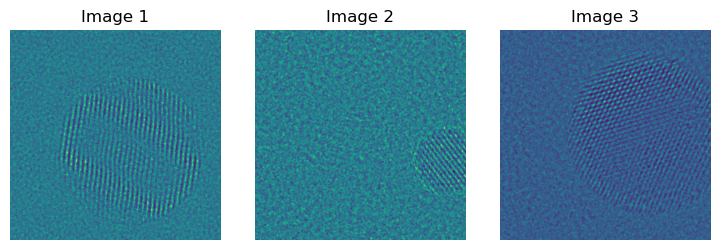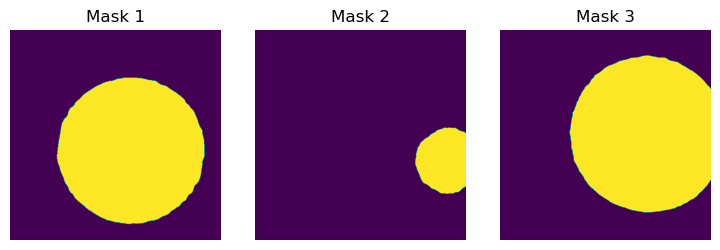---------------------------------------------------------------------------
RuntimeError Traceback (most recent call last)
Cell In[18], line 33
30 optimizer.zero_grad()
32 # Forward pass
---> 33 outputs = model(images)
34 loss = criterion(outputs, masks)
36 # Backward pass and optimize
File ~/mambaforge/envs/main11/lib/python3.11/site-packages/torch/nn/modules/module.py:1532, in Module._wrapped_call_impl(self, *args, **kwargs)
1530 return self._compiled_call_impl(*args, **kwargs) # type: ignore[misc]
1531 else:
-> 1532 return self._call_impl(*args, **kwargs)
File ~/mambaforge/envs/main11/lib/python3.11/site-packages/torch/nn/modules/module.py:1541, in Module._call_impl(self, *args, **kwargs)
1536 # If we don't have any hooks, we want to skip the rest of the logic in
1537 # this function, and just call forward.
1538 if not (self._backward_hooks or self._backward_pre_hooks or self._forward_hooks or self._forward_pre_hooks
1539 or _global_backward_pre_hooks or _global_backward_hooks
1540 or _global_forward_hooks or _global_forward_pre_hooks):
-> 1541 return forward_call(*args, **kwargs)
1543 try:
1544 result = None
Cell In[14], line 49, in UNet.forward(self, x)
47 def forward(self, x):
48 # Encoder
---> 49 conv1 = self.conv1(x)
50 pool1 = self.pool1(conv1)
51 conv2 = self.conv2(pool1)
File ~/mambaforge/envs/main11/lib/python3.11/site-packages/torch/nn/modules/module.py:1532, in Module._wrapped_call_impl(self, *args, **kwargs)
1530 return self._compiled_call_impl(*args, **kwargs) # type: ignore[misc]
1531 else:
-> 1532 return self._call_impl(*args, **kwargs)
File ~/mambaforge/envs/main11/lib/python3.11/site-packages/torch/nn/modules/module.py:1541, in Module._call_impl(self, *args, **kwargs)
1536 # If we don't have any hooks, we want to skip the rest of the logic in
1537 # this function, and just call forward.
1538 if not (self._backward_hooks or self._backward_pre_hooks or self._forward_hooks or self._forward_pre_hooks
1539 or _global_backward_pre_hooks or _global_backward_hooks
1540 or _global_forward_hooks or _global_forward_pre_hooks):
-> 1541 return forward_call(*args, **kwargs)
1543 try:
1544 result = None
Cell In[14], line 17, in DoubleConv.forward(self, x)
16 def forward(self, x):
---> 17 return self.double_conv(x)
File ~/mambaforge/envs/main11/lib/python3.11/site-packages/torch/nn/modules/module.py:1532, in Module._wrapped_call_impl(self, *args, **kwargs)
1530 return self._compiled_call_impl(*args, **kwargs) # type: ignore[misc]
1531 else:
-> 1532 return self._call_impl(*args, **kwargs)
File ~/mambaforge/envs/main11/lib/python3.11/site-packages/torch/nn/modules/module.py:1541, in Module._call_impl(self, *args, **kwargs)
1536 # If we don't have any hooks, we want to skip the rest of the logic in
1537 # this function, and just call forward.
1538 if not (self._backward_hooks or self._backward_pre_hooks or self._forward_hooks or self._forward_pre_hooks
1539 or _global_backward_pre_hooks or _global_backward_hooks
1540 or _global_forward_hooks or _global_forward_pre_hooks):
-> 1541 return forward_call(*args, **kwargs)
1543 try:
1544 result = None
File ~/mambaforge/envs/main11/lib/python3.11/site-packages/torch/nn/modules/container.py:217, in Sequential.forward(self, input)
215 def forward(self, input):
216 for module in self:
--> 217 input = module(input)
218 return input
File ~/mambaforge/envs/main11/lib/python3.11/site-packages/torch/nn/modules/module.py:1532, in Module._wrapped_call_impl(self, *args, **kwargs)
1530 return self._compiled_call_impl(*args, **kwargs) # type: ignore[misc]
1531 else:
-> 1532 return self._call_impl(*args, **kwargs)
File ~/mambaforge/envs/main11/lib/python3.11/site-packages/torch/nn/modules/module.py:1541, in Module._call_impl(self, *args, **kwargs)
1536 # If we don't have any hooks, we want to skip the rest of the logic in
1537 # this function, and just call forward.
1538 if not (self._backward_hooks or self._backward_pre_hooks or self._forward_hooks or self._forward_pre_hooks
1539 or _global_backward_pre_hooks or _global_backward_hooks
1540 or _global_forward_hooks or _global_forward_pre_hooks):
-> 1541 return forward_call(*args, **kwargs)
1543 try:
1544 result = None
File ~/mambaforge/envs/main11/lib/python3.11/site-packages/torch/nn/modules/conv.py:460, in Conv2d.forward(self, input)
459 def forward(self, input: Tensor) -> Tensor:
--> 460 return self._conv_forward(input, self.weight, self.bias)
File ~/mambaforge/envs/main11/lib/python3.11/site-packages/torch/nn/modules/conv.py:456, in Conv2d._conv_forward(self, input, weight, bias)
452 if self.padding_mode != 'zeros':
453 return F.conv2d(F.pad(input, self._reversed_padding_repeated_twice, mode=self.padding_mode),
454 weight, bias, self.stride,
455 _pair(0), self.dilation, self.groups)
--> 456 return F.conv2d(input, weight, bias, self.stride,
457 self.padding, self.dilation, self.groups)
RuntimeError: Input type (unsigned char) and bias type (float) should be the same

